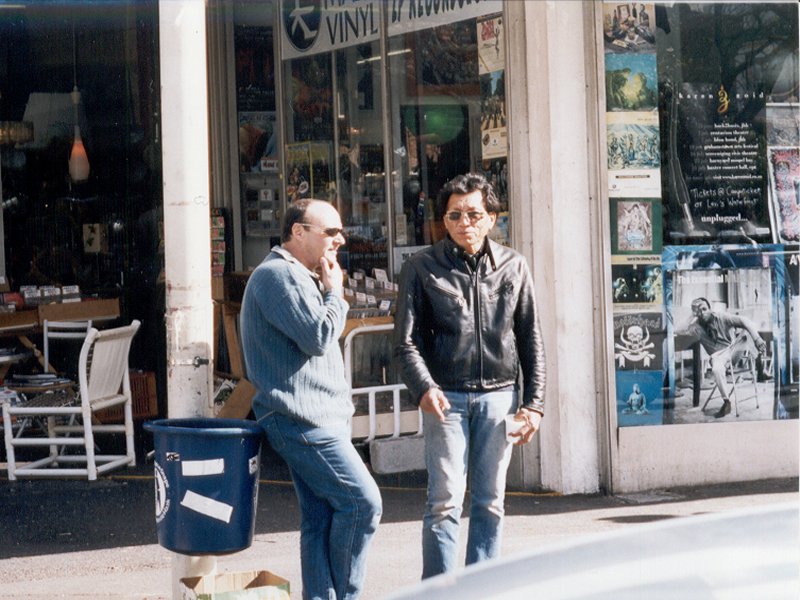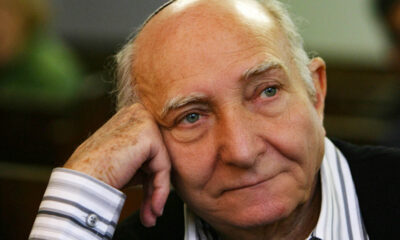
Featured Item

Bittersweet farewell to Sugarman
For most of his adult life, Stephen “Sugar” Segerman believed that his musical idol, Sixto Diaz Rodriguez, was dead. The tale of how Segerman and others “brought him back to life” is one of the greatest stories of our time. So, when Rodriguez actually passed away on 9 August at the age of 81, it was a “sad and surreal” day for Segerman and thousands of fans around the world.
“I think he’s at peace because he achieved what he needed to in the end,” says Segerman. “I’m not surprised at the outpouring of grief, love, and affection, which he fully deserved.”
“Because he ‘came back from the dead’, we always thought of him as immortal,” says Segerman’s daughter, Natalia Rabinowitz. “It didn’t occur to me that he would actually die one day. I feel like he was one of the lucky ones – his story got a happy ending and he gets to live forever through his music and the movie.”
Segerman reports that Rodriguez’ daughter said he was in a hospice after having a stroke, and passed away soon after. “In July, he had a birthday party in Detroit, with musicians coming together to celebrate him. But he looked like a shadow of his former self,” he says. Years of making a living in hard labour took its toll on Rodriguez’ body, but never stole his genius.
Segerman reflects how he even got his nickname from the rock icon’s most famous ballad, Sugarman. “I was a huge fan, and in the army, they used to call me Sugarman. I then moved into a commune and there were three Stephens, so I became Sugar. It just feels b’shert [ordained] that the guy who was named after the song became involved in the story. I’m honoured that I got to be part of it.”
Known professionally as Rodriguez, the American musician’s career was initially met with little fanfare in his home country. However, unbeknown to him, he was hugely successful in South Africa, Australia, and New Zealand, and his music encouraged white South Africans to question apartheid. Information about him was scarce, and it was incorrectly rumoured in South Africa that he had died by suicide. In the 1990s, determined South African fans managed to track him down, which led to an unexpected revival of his musical career.
This was told in the 2012 Academy Award-winning documentary, Searching for Sugar Man, which helped to bring his music finally to a global audience. Rodriguez lived his whole life in Detroit, Michigan, where he was eventually tracked down by fans Craig Bartholomew Strydom and Segerman.
When Searching for Sugar Man’s director, Malik Bendjelloul, went looking for “the greatest story on earth”, it was this one that grabbed his attention. “When we met for the first time, he said, ‘It’s a great story, but it won’t work if the music’s not great,’ recalls Segerman. “I played him Cold Fact, and he was hooked.” Looking back, Segerman feels that the film was like a “comet”, shining so bright and moving so fast, it had a life of its own.
The opening scenes of the film talk about how Rodriguez’ fans believed he had died by suicide, and he was eventually found alive and well. Yet it was the film’s director, Bendjelloul, who ultimately took his own life at an underground train station in Stockholm in 2014. “Malik once told me that there are a lot of suicides in Stockholm, and there’s a place where people jump,” says Segerman. “When he died, people were unsure if he had been pushed. But I knew he had done it because he had told me about that place.”
Segerman will never understand why this bright, brilliant 36-year-old made that choice. “He was a genius to make the film that he made. I can’t tell you how many times, when Craig [Bartholomew Strydom] and I were writing our book [about their journey to finding Rodriguez], we wanted to call Malik to clarify something. So many people miss him.”
They dedicated the book to him, and the final chapter is a tribute to this unassuming Swede, who found the story that the world didn’t know it needed about a famous musician they’d never heard of. “On days like today, [on Rodriguez passing], I really wish he was here to see the impact he made,” says Segerman.
For fans, it’s the end of an era. “Rodriguez was part of the soundtrack of my youth,” says veteran journalist Raymond Joseph. “I had Cold Fact on a four-track cassette that I had on constant replay for a while.”
Like many young men conscripted into the apartheid regime’s army, Rodriquez’ music offered Joseph an escape and a different narrative. “When I was conscripted in 1972 to the army, guys in my bungalow had guitars, and Rodriguez was part of their repertoire. Many of us knew his songs word for word and sang along. It made us feel free and rebellious as the army was trying to break us down.
“And when an earlier album, Coming From Reality/After The Fact was released in South Africa based on the success of Cold Fact, I fell in love with his music all over again,” says Joseph. “I met him backstage in Cape Town in 1998. He was shy and self-effacing and, it seemed, blown away by his fame in South Africa.
“But he was a different character when he came on stage. If I had died that night, I would have died a happy man. Two of my most prized possessions are CDs that he signed for me that night. In fact, I dug out Cold Fact and listened to it just a day or two before his death was announced. It was a great injustice that he received the recognition he so richly deserved only so late in life. But he lives on in his music and in the hearts of fans.”
“Rodriguez toured the world and had a fantastic career in the end,” says Segerman. “His daughters were so proud.” For Segerman, the greatest moment of the journey was when Rodriguez called him for the first time, in the middle of the night in Cape Town. When he said, ‘Hello, is that Sugar?’ it was a voice I knew so well … that moment still resonates,” says Segerman. He later hosted Rodriguez in his own home.
Segerman believes the most important message of the story is that “many creative people don’t get the success they deserve, but that doesn’t mean you can give up. Be creative, because you’re blessed with it. Success can come later, and you never know when that will be.”
He says many people played a vital part in the story, especially “musicologist detective” Strydom, “who did a fortune of work” in finding Rodriguez and bringing his story to the world.
“It was a once in a lifetime thing, being part of this journey,” says Segerman. “At the Vanity Fair party after the Oscars when we won [best documentary], we were seated at the same table as Buzz Aldrin. I realised that, just like him, I had been to the moon, and I’m not going back. I’m just very grateful. Rodriguez’ legacy lives on.”










